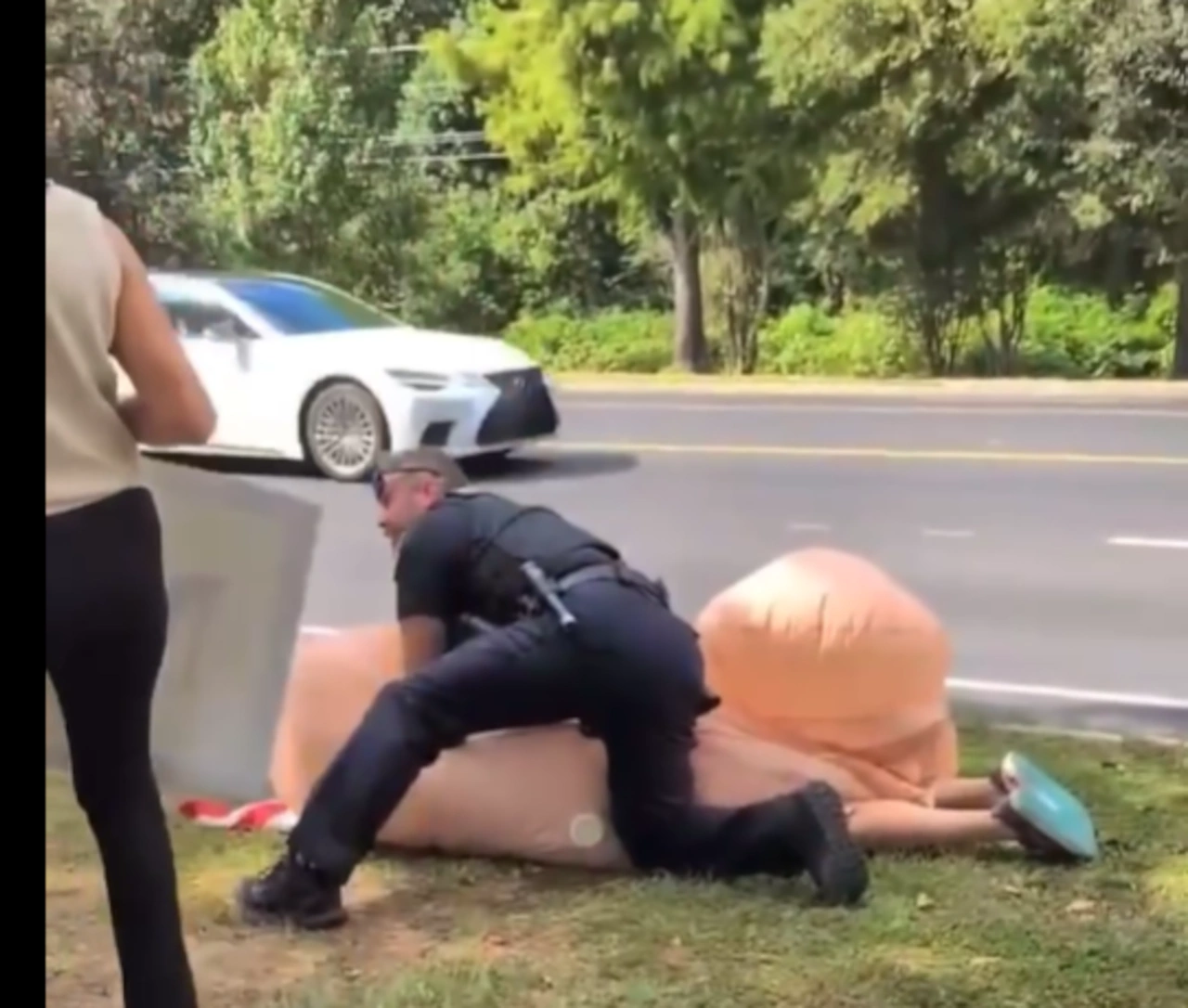Copyright AL.com

A protester dressed in an inflatable penis costume arrested Saturday during a “No Kings” demonstration has ignited debate over First Amendment protections in a city already engulfed in a contentious battle over library book censorship. Jeana Renea Gamble, 61, was arrested after what cellphone videos show as a swift and aggressive police response. The arrest took place in downtown Fairhope, where Gamble was participating in a political protest while wearing the costume. Her arrest has drawn attention not only for its dramatic visuals but also for the broader implications it raises around free speech, especially as Fairhope continues to be the center of a heated dispute over what is obscenity in its public library. Defending arrest Fairhope Mayor Sherry Sullivan and City Council President Jack Burrell addressed the arrest on Monday, saying Gamble was taken into custody primarily for resisting arrest and for wearing attire they described as inappropriate for public spaces. “She resisted arrest and was wearing an outfit that is not appropriate in public,” Burrell said. While both Sullivan and Burrell have remained relatively neutral on the ongoing library debate, they have expressed support for the Fairhope Public Library against mounting pressure from conservative activists. Those activists, supported by the Alabama Public Library Service (APLS), have pushed for the relocation of books labeled “sexually explicit” from teen and youth sections to adult areas. Burrell said of the misdemeanor charges Gamble faces for disorderly conduct and resisting arrest: “We want to make sure we don’t violate someone’s constitutional rights, and I hope the police have enough evidence that they stand behind the charges.” Burrell added that Fairhope’s “community standards” do not support public displays like penis costumes, even during political protests, and suggested such attire might be more appropriate in places like Bourbon Street in New Orleans. First Amendment rights But constitutional attorneys argue the arrest may violate Gamble’s rights under the First Amendment. “This is the kind of arrest that normally should result in the disciplinary action in those involved and a pledge to retrain the Police Department for violating someone’s First Amendment rights,” said Adam Steinbaugh, an attorney with the Foundation for Individual Rights and Expression, a nonprofit civil liberties group. Russell Weaver, a law professor at the University of Louisville, echoed that sentiment. “This is political speech, and it certainly doesn’t meet the definition of obscenity,” he said. Indivisible of Baldwin County, the group that organized Saturday’s protest, issued a statement Monday strongly condemning the arrest. The group said Gamble was peacefully expressing her views when police determined her behavior was “rude.” They called the arrest “indefensible, morally and legally.” “Public officials must take seriously their duty to uphold the First Amendment,” the group said in the statement. “Their complete failure to do so in this situation runs against the free expression of values that created the City of Fairhope and against the liberty guarantees enshrined in Alabama law and the United States Constitution.” Similar issues The timing of Gamble’s arrest coincides with an ongoing culture war over book placement in the Fairhope Public Library, a conflict that has drawn statewide attention and led to significant funding consequences. The APLS board froze approximately $42,000 in state funding to the Fairhope library earlier this year after determining that local officials failed to follow strict new policies on what qualifies as “sexually explicit” material. Those guidelines apply to any content — visual, written or audio — depicting sexual conduct, including nudity, masturbation, sadomasochism or “lascivious exhibition.” City leaders have largely supported the Fairhope Library Board, which has conducted multiple reviews of challenged titles and rejected calls to relocate some of the books. One of the titles is 2006’s “Sold,” which is about child sex trafficking in India and whose author spoke about the issue while in Fairhope on Thursday. Library officials have argued that the APLS definition is overly broad and could apply to virtually any book that mentions sexuality, regardless of context. They also argue that the books do not meet the definition of obscenity, which is not protected by the First Amendment, and which federal courts say are examined on whether the average person finds the material to lack serious literary, artistic, political or scientific value and whether it appeals to the “prurient interest” inciting lasciviousness or lust. With Gamble’s arrest, similar questions about what constitutes acceptable public expression are arising and, this time, the city is on the other side of the debate. Gamble’s costume is critical of President Donald Trump, using a vulgar word to refer to him as a dictator. “There are very narrow exceptions to the First Amendment, and among them are obscenity,” Steinbaugh said. “But obscenity is something that is, in some sense, erotic. That is not this. It’s a political speech at a political demonstration. That context alone should sound alarm bells in that police department that you’re crossing some clear First Amendment lines here.” He cited the 1971 case, Cohen v. California, in which the U.S. Supreme Court decided in a 5-4 decision that the State of California could not criminalize 19-year-old Paul Robert Cohen for wearing a jacket with a vulgarity written on it while inside a Los Angeles courtroom. The case stemmed from protests against the Vietnam War and the draft. “The government pointed out that women and children were present to see this (jacket),” Steinbaugh said. “But the Supreme Court said that is protected speech and the solution to not seeing something you don’t like is to look the other way, and not take someone away in handcuffs.” He said that authorities typically do not arrest people for similar penis displays in public, such as trailer hitch testicles or decorations for bachelorette parties. “If you have police officers going around and saying your costume is offensive, and are going to jail for it, that’s speech police,” Steinbaugh said. Indivisible Baldwin County agreed that the same standards should apply in modern protests. “People should not be subjected to violent overreach by police just because they exercise their right to free speech in ways that are controversial or impolite,” the group’s statement reads. “Speech, but only in ways the opponents of a message approve, is not free speech at all.”



